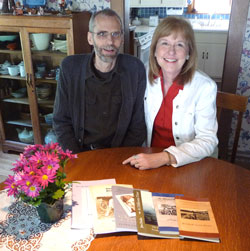“Why should I write about my life? No one will read it!” The eight-something, frail woman pushed her walker up to me and seemingly issued a challenge. What should I say? Why should we care about her story?
Many women of her generation devoted their lives to their families. Their husbands were fighting in wars, inventing new products, creating and managing companies, or running for office. Their wives and widows feel as though their contributions are not note-worthy. The movers and shakers stand front and center to tell their stories while those behind the scenes slip quietly off stage.
My response to my challenger was “Everyone’s story deserves to be told.” It is true that some events or accomplishments have a wider ripple effect, but all of us influence our environment in small ways. The “woman behind the man” made it possible for him to accomplish what he did, but she also probably has insights and opinions about what was happening in the world around her. That’s what we need to hear more of. The history books are full of the facts of major events, but only individuals can tell how those events affected their lives.
I recently read The Hare with Amber Eyes, a memoir by Edmund DeWaal and In the Garden of Beasts, the history of Ambassador Dodd and his daughter as told by Erik Larson. Both writers were able to capture the personal side of life in Nazi Germany. Through their words we can better understand the pain and fear experienced by some of the men and women who were there. But DeWaal and Larson’s books were only possible because they had access to letters, diaries, and memoirs written by their central characters. Some of the memories are painful. Some may seem trivial. Others provide comic relief. But in the end we have a deeper understanding of those people and the time in which they lived.
I want to learn about “life in the trenches” from the people who lived it, whether on a farm, in a city, on Main Street, or in a mountain cabin. And often it’s the women who should be telling the story. Let’s make sure they know that we care.








